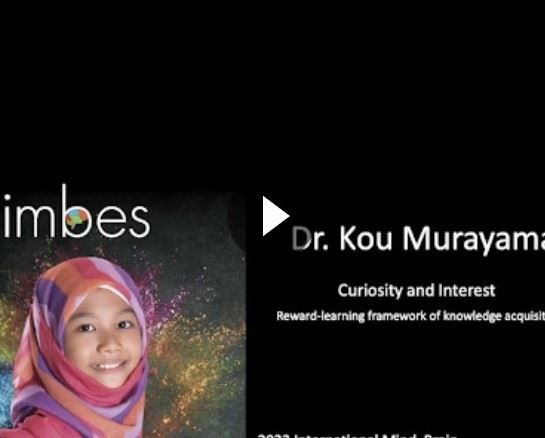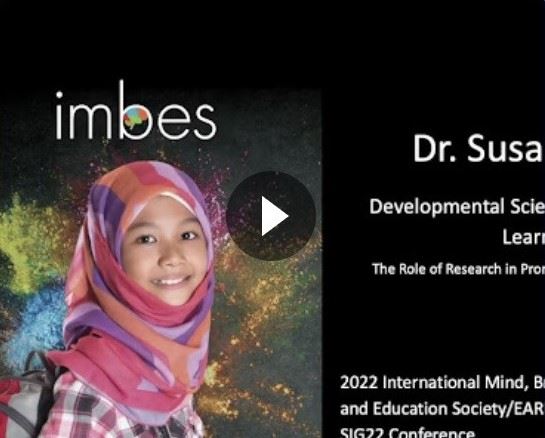2022 IMBES Conference
Timetable
| Thursday, July 21st, 2022 | |||||
|---|---|---|---|---|---|
| Time | OPUS 1 | OPUS 2 | CONCERTO | VIVALDI | TCHAIKOVSKY |
| 7:30 a.m. – 6:30 p.m. | Registration and Poster Setup (FOYER) | ||||
| 9:00 a.m. – 10:00 a.m. | Preconference – Writing Workshop with Annie Brookman-Byrne | ||||
| 10:15 a.m. – 10:45 a.m. | Preconference – Peer Mentorship Session | ||||
| 11:00 a.m. – 11:30 a.m. | Preconference – Pitch Talks | ||||
| 11:45 a.m. – 12:45 p.m. | Preconference – Lunch with Leaders | ||||
| 1:00 p.m. – 1:45 p.m. | Preconference – Panel Discussion on Educator Needs | ||||
| 2:00 p.m. – 2:30 p.m. | Welcome and Conference Overview | ||||
| 2:30 p.m. – 4:00 p.m. | SIG22 Keynote Address: Kou Murayama | ||||
| 4:00 p.m. – 6:00 p.m. | Poster Session #1 and reception (FOYER) | ||||
| 7:00 p.m. – | IMBES Board Meeting and Dinner | ||||
| 8:00 p.m. – 9:00 p.m. | Preconference – Networking Dessert | ||||
| Friday, July 22nd, 2022 | |||||
|---|---|---|---|---|---|
| Time | OPUS 1 | OPUS 2 | CONCERTO | VIVALDI | TCHAIKOVSKY |
| 7:30 a.m. – 8:30 a.m. | Registration, Breakfast and Poster Setup (Foyer) | EARLI Sig 22 Breakfast Meeting | |||
| 8:30 a.m. – 10:00 a.m. | Keynote Address: Elizabeth Bonawitz | ||||
| 10:00 a.m. – 10:30 a.m. | Break and moving of airwall to OPUS 1 and 2 | ||||
| 10:30 a.m. – 12:30 p.m. | The role of relational reasoning in mathematical and spatial thinking: Implications for STEM education | Neuro-cognitive mechanisms of conceptual change in science and mathematics learning | Early Executive Functions Interventions and Educational Outcomes: Understanding successes and failures via a multilevel approach | Equitable Education through Active Learning | Mindset: Mechanisms, Relevance and Implementation |
| 12:30 p.m. – 12:45 p.m. | Moving of Airwall, Lunch setup | ||||
| 12:45 p.m. – 2:00 p.m. | LUNCH AND AWARDS PRESENTATIONS | ||||
| 2:00 p.m. – 2:30 p.m. | Moving of Airwall, Lunch takedown | ||||
| 2:30 p.m. – 4:30 p.m. | Tools for Spatial Thinking: Facilitating Learning and Engendering Spatial Habits of Mind | Neuroscience Research in Authentic Educational Contexts | The role of inhibitory control in math and science education | Critical roles of emotions in students' learning, motivation, and development | Executive functions in early childhood: Examining possibilities to foster child executive functions in educational settings |
| 4:30 p.m. – 6:30 p.m. | Poster Session #2 and reception (FOYER) | ||||
| Saturday, July 23rd, 2022 | |||||
|---|---|---|---|---|---|
| Time | OPUS 1 | OPUS 2 | CONCERTO | VIVALDI | TCHAIKOVSKY |
| 7:30 a.m. – 8:30 a.m. | Breakfast | ||||
| 8:30 a.m. – 10:00 a.m. | Keynote Address – Nathan Fox | ||||
| 10:00 a.m. – 10:30 a.m. | Break and moving of airwall to Opus 1 and 2 | ||||
| 10:30 a.m. – 12:30 p.m. | UNESCO’s International Scientific Evidence-Based Education Assessment (ISEEA): towards a transdisciplinary research agenda and policy impact | Bridging educational practice and neuroscience to study developmental language disorders: a review of neuroimaging approaches | Understanding the Relation between EF and Math in Early Childhood: Insights from New Research and Perspectives | Neuro/Cognitive Research to Inform Neurodiverse Education | Developmental Perspectives: Digital Interventions and Mathematics Learning in Typical and Atypical Populations |
| 12:30 p.m. – 2:00 p.m. | Lunch on own (moving of airwall for OPUS 1 and 2) | ||||
| 1:00 p.m. – 2:00 p.m. | Impact of Digital Tools on Education Research | Applying the Science of Learning to Teacher Preparation | Writing Workshop #2 with Annie Bookman-Byrne | ||
| 2:00 p.m. – 3:30 p.m. | Keynote Address – Susan Levine | ||||
| 3:45 p.m. – 4:45 p.m. |
SIG22 Lightning Talks
|
||||
| 4:45 p.m. – | Poster Award Presentations and Closing Remarks | ||||
Keynote Speakers
| Nathan A. FoxNathan A. Fox is Distinguished University Professor at the University of Maryland in the Department of Human Development and Quantitative Methodology. He has completed research on the biological bases of social and emotional behavior developing methods for assessing brain activity in infants and young children during tasks designed to elicit a range of emotions. His work on the temperamental antecedents of anxiety is funded by the National Institutes of Health where he was awarded a MERIT award for excellence of this research program. He is also a Principal Investigator on the Bucharest Early Intervention Project, a randomized trial to determine the efficacy of family care for infants with a history of abandonment and institutionalization. Dr. Fox is an elected a Fellow of the American Association for the Advancement of Science, the Association for Psychological Science and the American Academy of Arts and Sciences and received the Distinguished Scientific Contributions Award from the Society for Research in Child Development and the Distinguished Mentor Award and G. Stanley Hall Award for Lifelong Achievement in Developmental Science from Division 7 of the American Psychological Association. He is also the recipient in 2017 of the Ruane Award for Outstanding Research in Child and Adolescent Psychiatry and is a founding member of the National Scientific Council for the Developing Child where he is co-Scientific Director of this group. |
| Susan C. Levine, Ph.D.Susan C. Levine, Ph.D., is the Rebecca Anne Boylan Distinguished Service Professor in Education and Society in the Departments of Psychology, Comparative Human Development, and the Committee on Education at the University of Chicago. She received her Bachelor of Science degree in Mathematics, Psychology and Education at Simmons College and a Ph.D. in Psychology at M.I.T. Her research examines the development of mathematical thinking, the relation of numerical and spatial thinking, and how variations in math learning experiences at home and at school affect this development. In another line of research, she studies the development of emotions and attitudes about math and their relation to math learning outcomes. Finally, she studies the potential of various kinds of interventions, including parent-child engagement with mathematical books, play activities, and technology, to enhance children’s math learning. She served as a co-PI of the Spatial Intelligence and Learning Center, an NSF Science of Learning Center and is currently a member of the Development and Research in Early Math Education (DREME) network. She received the Ann L. Brown Award for Excellence in Developmental Research and is a Fellow of the American Academy of Arts and Sciences, the Association for Psychological Science, and the American Association for the Advancement of Science. |
| Elizabeth BonawitzElizabeth Bonawitz is the David J. Vitale Associate Professor of Learning Sciences at Harvard University. Her work focuses on the basic science theories of learning with the broader goal of informing educational practice. Her research bridges two research traditions: cognitive development and computational modeling. Specifically, Bonawitz’s empirical approach focus on the structure of children's early causal beliefs, how evidence and prior beliefs interact to affect children's learning, the developmental processes that influence children's belief revision and curiosity, and the role of social factors (such as learning from others) in guiding learning. Bonawitz received her Ph.D. from MIT in the brain in cognitive sciences in 2009 working with Dr. Laura Schulz. She then completed a post-doctoral fellowship at University of California, Berkeley with Thomas Griffiths and Alison Gopnik (2009-2013). She was an Assistant and Associate professor of psychology at Rutgers University, Newark from 2013 until 2020 when she moved to Harvard. Bonawitz is the recipient of the James McDonnell Foundation Understanding Human Cognition Scholar Award and the Jacobs Early Career Research Fellowship. Her work is additionally currently funded by several NSF grants, the Caplan Foundation, and the Templeton Foundation. Her research has been published in top journals in psychology, cognitive science, and education. Additionally, she has served as Associate Editor for Cognitive Science (journal) and is on the governing board of the Cognitive Development Society and Children Helping Science. |
 | Kou MurayamaKou Murayama is a Professor for Educational Psychology at the Hector Research Institute of Education Sciences and Psychology. In 2020, he has been awarded with the prestigious Alexander von Humboldt Professorship. Kou Murayama's research focuses on a number of overlapping questions about how motivation works in human functioning. With his broad and interdisciplinary background both in basic and applied (especially educational) sciences, his research program features a “multimethod approach”, combining a number of different perspectives, and methodologies (e.g., longitudinal modeling, behavioral experiments, neuroimaging, ecological momentary assessments, meta-analysis, educational intervention, computational/statistical simulation) to gain a comprehensive understanding of motivation. One of the central themes of his recent work is to understand how humans are autonomously motivated to seek and gain knowledge (motivational state often called “interest” or “intrinsic motivation”) and how we can apply this idea to educational settings. |
US Travel Awards
With generous support from the National Science Foundation, IMBES will make travel awards of $2000 to support travel to the IMBES meeting. Applicants must be US-based, given the scope of the NSF funding mandate, and should fit one or more of the following categories:
- teacher practitioners or evidence-based education leaders
- MBE scholars-in-training or ECR who identify with and/or study under-represented groups
- MBE scholars-in-training or ECR who conduct research with international scope
- MBE scholars-in-training or ECR who can assist IMBES with science communication/outreach work.
We request that applicants provide a brief biosketch (200 words) and a brief statement of how they fit in one or more of the categories (500 words). The deadline was May 22nd. 2022.
Poster Submission
Guidelines for Poster Submissions
The International Mind, Brain, and Education Society (IMBES) extends an open invitation to participate in poster presentations at the July 21st-23rd, 2022 conference in Montreal. Poster sessions give presenters an opportunity to showcase innovative work from neuroscience, cognitive science, developmental science, or educational science or practice that is relevant to mind, brain, and education.
The final deadline for poster submissions was Monday April 18th, 2022. Thank you to all those who submitted.
Four posters will be selected at the conference to receive the 2022 IMBES Outstanding Poster Award. These awards will consist of a certificate and $250 USD.
Symposium Submission
Guidelines for Symposium Submissions
- Symposia and Panel Discussions will be 2 hours in length.
- Formats are flexible, but must include a Chair and two to four participating members. We encourage you to select a diverse group of speakers (e.g. speakers from different universities, countries, professional backgrounds, or levels of training).
- The goal should be to generate discussions around pertinent issues that emerge at the intersections of Mind, Brain and Education.
- The Chair should select participants who are recognized experts and can provide a framework for thinking about the topic under consideration, offer insights, and address questions.
- At the end of each session there should be a period for discussion.
All panel and symposia proposals received by February 11th, 2022 will be considered for the program and will be peer-reviewed.
Submitters will be notified by e-mail regarding the acceptance of their submission to the IMBES Conference.
Note: IMBES prohibits reference to commercially available products affiliated with presenters in all presentation formats without express written permission from the Board.





